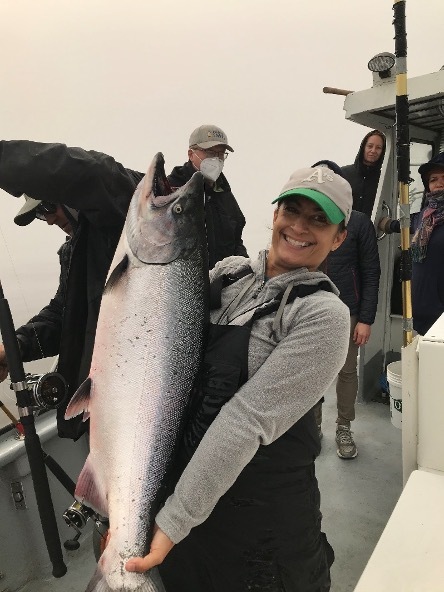
This year’s fishing season was set with an expectation that after fishing there would still be over 200,000 spawning salmon in the Sacramento Basin. Ask any river guide and you’ll hear they have not seen such a return this year. What gives? We don’t know for sure but here are a few things to consider. Commercial trollers reported there were still large spawning salmon to be found in very deep ocean waters as of mid-September. Add to that the possible loss of the early part of the fall run in the upper Sacramento due to hot water coming out of Shasta in late October and early November (killing eggs laid prior) and the drastic reduction of those Shasta releases at the same time in most years that dewaters and kills salmon nests. Fall run salmon that arrive in the upper Sacramento after Thanksgiving find much better conditions and successfully spawn. If we’ve lost the early part of the run then it stands to reason that the survivors will stay out in the ocean longer and not arrive in the rivers until later. In recent years we’ve seen fall run adults returning to spawn as late as January.
In addition, survival of hatchery fish released into the ocean at Sausalito, Santa Cruz and Half Moon Bay, are much higher than those released in the interior bay or Delta and are likely making a significant contribution to the population in the ocean. Many of these hatchery fish originate at the Mokelumne hatchery and tend to return to the Mokelumne and American Rivers. These fish are also generally derived from adults coming to the Mokelumne hatchery in November.
If the above is more true than not, improvements to hatchery release practices are making an improvement to the ocean fishery but may not provide many additional fish to the Feather River or upper Sacramento River fisheries.
The Coleman hatchery in the upper Sacramento produces over 12 million baby salmon annually. In the hatchery, these fish are shielded from redd dewatering and hot water issues. Once released into the river, they only survive in years when there’s enough water, after spring time diversions, to survive the trip down to the sea. The same is true for the natural spawned, or “wild” fish from rivers throughout the Sacramento Valley. In many years, after springtime diversions, there just isn’t enough water to safely pass the majority of these fish to the ocean which might be why we aren’t seeing more fish returning to various parts of the Sacramento Basin.Recent studies demonstrate that up to the 43 percent of hatchery fish, including those from the Feather River and Nimbus hatcheries, released into the bay near Vallejo, die before getting to the Golden Gate Bridge. This seems like a strong reason to move their release site closer to the Golden Gate Bridge, something GSSA is advocating for in our Salmon Rebuilding Plan
The Golden Gate Salmon Association is a coalition of salmon advocates that includes commercial and recreational salmon fisherman, businesses, restaurants, a native tribe, environmentalists, elected officials, families and communities that rely on salmon.
GGSA’s mission is to restore California salmon for their economic, recreational, commercial, environmental, cultural and health values.
Currently, California’s salmon industry is valued at $1.4 billion in economic activity annually in a regular season and about half that much in economic activity and jobs again in Oregon. The industry employs tens of thousands of people from Santa Barbara to northern Oregon. This is a huge economic bloc made up of commercial fishermen, recreational fishermen (fresh and salt water), fish processors, marinas, coastal communities, equipment manufacturers, the hotel and food industry, tribes, and the salmon fishing industry at large.
Report Date:
Third Party, Non-profit Group Works with Grape Growers To Sustain Water Habitats for Fish NAPA, California (June 15, 2020)—The Fish Friendly......
Report Date:
Court Orders Feds to Trim Fish Killing Delta Water Diversions Fresno, California -- On Monday, May 11, a federal court ruled......